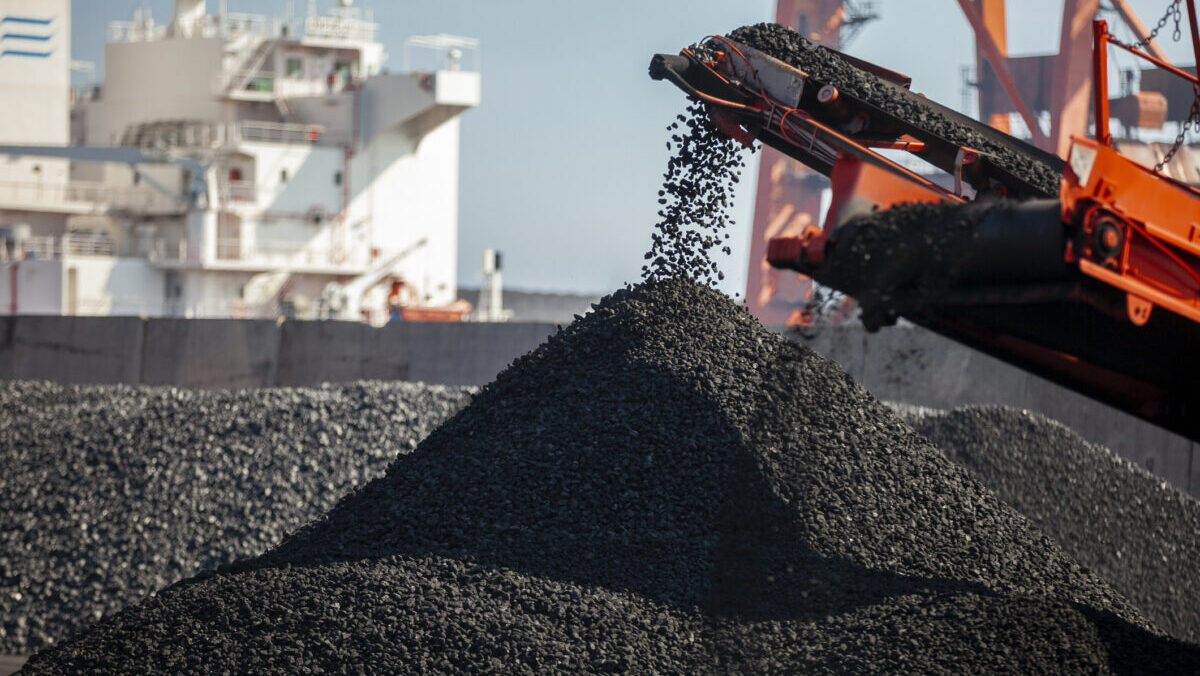Ground Breakers: Whitehaven shops potential met coal stake, sees support for thermal prices

Pic: Indigo Division/iStock via Getty Images
- Whitehaven Coal says thermal coal prices are being supported after a more than 60% fall last year
- Coal giant is looking at potential sell-down of a stake in its newly acquired Blackwater mine in Queensland, part of a $6.4b deal with BHP that also includes the Daunia asset
- Yancoal shares soar on strong production update
Whitehaven Coal (ASX:WHC) could leverage strong demand from steelmakers for metallurgical coal to sell a minority stake in a mine to be acquired from BHP (ASX:BHP), but sees support for “strong” thermal coal pricing as well as it engineers a major transformation.
Whitehaven Coal (ASX:WHC) has eaten a more than halving of coal prices since December 2022, with sales prices falling from $527 to $216/t by the final quarter of last year.
That has come amid a slowing of demand from the Northern Hemisphere, which is well stocked for gas and other sources of energy after a mild 2022-23 winter after the invasion of Ukraine by Russia sent prices soaring to unforeseen levels in excess of US$400/t in 2022.
WHC’s thermal coal prices have sagged from US$351/t to US$142/t in a year, though with cost guidance in the $103-113/t range (Aussie), it has plenty of headroom even if it expects to be towards the top of that range for FY24.
While high CV Newcastle thermal coal prices tumbled some 66% last year Whitehaven, which saw ROM production fall 6% in the September quarter to 5Mt (still on track for guidance of 18.7-20.7Mt), the leading Aussie coal miner says it is seeing support at current levels.
CEO Paul Flynn described the current price range of US$120-150/t as ‘resilient’, with the company also expecting to end its discounted domestic reservation requirements under a NSW scheme in June this year.
“The structural supply shortfall in the seaborne market for high CV thermal coal is continuing to grow as a result of underinvestment in new supply and depletion of existing mines,” Whitehaven said.
“This growing supply gap is supporting strong long term high CV thermal coal prices.
“Short term supply disruptions, such as weather related impacts in Queensland and a derailment on the Hunter Valley’s Ulan line that occurred in December, as well as Russian coal sanctions also continue to contribute to tightness in supply.
“The gC NEWC index averaged US$135/t in the December quarter and the monthly index traded in a range of US$122-$147/t. Given the December quarter is a shoulder season from a demand perspective, these strong prices are encouraging.”
Move to met
Coal demand sat around an all time high again last year, showing anyone hoping for a fast transition to cleaner energy sources is likely to be frustrated.
Large users China and India satisfy much of their demand domestically, but high grade metallurgical coal — which unlike thermal coal has no technical solution to remove it from the steelmaking supply chain just yet — is showing itself to be a greener pasture.
Whitehaven offered up to $6.4 billion to BHP (ASX:BHP) last year to take the Daunia and Blackwater mines of the hands of its BMA JV with Mitsubishi.
Hard coking coal prices averaged US$333/t in the December quarter, driven largely by the Indian market and supply issues in Australia according to WHC.
In the December quarter just 9% of Whitehaven’s sales mix was met coal. Once the BHP deal is complete — expected in early April — around 70% of its revenues are expected to come from coking coal.
It’s also likely to make it easier for banks and investors nervous about thermal coal to invest and finance WHC, which announced a new five year US$1.1b credit facility last year.
The company had $1.5b in the bank after making an $833m tax payment and US$100m cash deposit for the Daunia and Blackwater deal.
““While high CV thermal coal prices remain resilient in
the range of around US$120-$150/t, HCC metallurgical coal prices have strengthened to ~US$300-$350/t, which will deliver benefits for Whitehaven post completion of our acquisition,” said Flynn, who also told analysts on a conference call interest had been strong in backing its acquisition facility.
“The US$1.1 billion 5-year credit facility together with cash held of A$1.6b (US$1.1b) and ongoing cash generation underpin the completion of the announced acquisition of Daunia and Blackwater mines expected in early April 2024.”
Selldown on the way
Part of the acquisition costs look like they’ll be made up with a sell down, with Whitehaven revealing it will look to trade on around 20% of the “well understood” Blackwater mine to global steel producers as strategic JV partners.
Its a structure that isn’t unusual for recent coal deals. Glencore’s acquisition of Teck’s Elk Valley met coal mines in Canada for instance were supported by Nippon Steel and POSCO, with the whole lot to change hands for US$9b.
Flynn said a sell down of Daunia could be sought later, but would not be progressed immediately with plans to integrate it with the nearby Winchester South development asset still being worked through, with WHC’s nearby deposit to potentially extend its life to 50 years.
He said with a change of control transaction coming up, interest from steel producers looking to secure a long term source of supply from Blackwater was strong amid a rise in steel production from emerging economies like India.
India’s JSW Steel was rumoured to be a player in the bidding process for the Teck coal assets that eventually went, primarily, to Glencore and Japan’s Nippon.
“There’s a change in ownership pending of course and there are more interested parties in the market for this type of coal than there was in the past,” Flynn said.
“This coal has traditionally found itself in the Japanese market, the Indian market has become a very big piece of the puzzle here.
“And and so there is competition for this type of coal so the users of that coal historically, are understandably, keen to secure long term certainty for that volume given that there are newer and big competitors in the market for the same materials.
“There’s not long term offtake arrangements that we’re aware of that are coming to a conclusion.
“It’s really just a reflection of the fact that this is a big player. It’s been in the market for a long time. Change of control clearly coming up.
“And there are new entrants into the market who are looking to secure long term supply and you’ve seen them play out with other transactions.”
Whitehaven will pay an initial US$2.1b on the completion of the Daunia and Blackwater transaction, and US$1.1b over three years after the deal is wrapped. Another US$900m could be payable over three years dependant on realised coal pricing.
Yancoal hits straps in fourth quarter
Fellow coal miner Yancoal (ASX:YAL) tells a similar story on coal prices, with its December accounts revealed a 1% fall in prices to $196/t.
But it says its full year costs will fall around the mid-range of its $92-102/t guidance range after hitting its best production run rate for the year in the December quarter.
The Chinese backed Australian coal miner ramped up saleable production on a 100% basis by 7% to 12.9Mt in the fourth quarter, with ROM production up 12% to 18.1Mt.
That’s 57% higher than the same period in December 2022.
With shipments through the Port of Newcastle up 6% in the past year, Yancoal’s 12 month ROM production rose 19% to 60.2Mt in 2023, with its saleable production up 12% to 43.6Mt and attributable saleable production up 14% to 33.4Mt, around the mid-point of its 31-36mt range.
Coal sales attributed to Yancoal were up 13% to 33.1Mt, though prices fell some 39% to $232/t on average from $378/t in 2022.
While northern hemisphere demand was down, CEO David Moult said thermal coal supply was meeting incremental demand from India and Vietnam, flagging that this year it would focus on trying to reduce operating costs after a solid second half.
“We are focused on maintaining production around the 4Q rate through 2024 and further reducing cash operating costs, so that our cash generation capabilities continue irrespective of coal
market conditions,” he said.
Yancoal shares rose 9.1% after adding $477m to its bank account to take its cash balance to $1.40b, while Whitehaven shares lifted over 5%.
Whitehaven Coal (ASX:WHC) and Yancoal (ASX:YAL) share prices today
UNLOCK INSIGHTS
Discover the untold stories of emerging ASX stocks.
Daily news and expert analysis, it's free to subscribe.
By proceeding, you confirm you understand that we handle personal information in accordance with our Privacy Policy.








